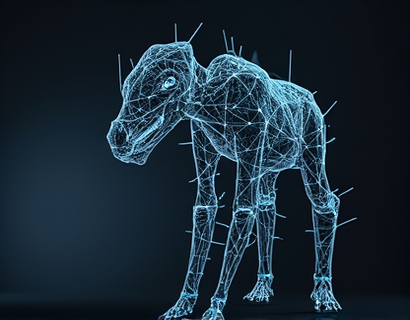Decentralized Authentication: Revolutionizing Business Security and Access with Advanced Identity Management Solutions
In the digital age, the importance of robust security measures cannot be overstated. As businesses increasingly rely on digital platforms to conduct operations, the need for advanced identity management solutions has become paramount. Decentralized authentication stands out as a transformative approach, offering enhanced security, efficiency, and user experience. This article delves into the intricacies of decentralized authentication, exploring how it is revolutionizing business security and access control through innovative identity management solutions.
Traditional authentication methods, such as username-password combinations and centralized databases, have proven to be vulnerable to breaches and cyber attacks. These systems often rely on a single point of failure, making them attractive targets for malicious actors. Decentralized authentication, on the other hand, distributes control and storage across a network of nodes, eliminating the risk associated with centralized databases. This decentralized approach ensures that even if one node is compromised, the entire system remains secure.
The core principle of decentralized authentication lies in blockchain technology, a distributed ledger that records transactions across multiple nodes. Each transaction, or block, is linked to the previous one, forming a chain that is nearly impossible to alter without consensus from the network. This inherent transparency and immutability make blockchain an ideal foundation for identity management. By leveraging blockchain, decentralized authentication solutions can provide a secure and tamper-proof way to manage user identities.
One of the key benefits of decentralized authentication is the enhancement of user privacy. In traditional systems, user data is often stored in centralized databases, making it a prime target for data breaches. With decentralized authentication, user identities are stored locally on devices or in a distributed network, reducing the risk of large-scale data exposure. Users maintain control over their own identity data, deciding who can access it and under what conditions. This shift empowers individuals and gives them greater autonomy over their personal information.
Decentralized authentication also improves operational efficiency for businesses. By streamlining the authentication process, organizations can reduce the friction associated with multiple login credentials and complex access controls. Users can access various applications and services seamlessly, without the need to remember multiple passwords or go through cumbersome verification processes. This not only enhances the user experience but also increases productivity and reduces support costs for IT departments.
Another significant advantage is the reduction in administrative overhead. Centralized systems require constant monitoring and maintenance to ensure security, which can be resource-intensive. Decentralized authentication automates many of these tasks, such as key management and identity verification, through smart contracts and automated consensus mechanisms. This automation minimizes the need for manual intervention, allowing IT teams to focus on more strategic initiatives.
Security is, of course, the primary concern for any authentication solution. Decentralized authentication addresses this by employing advanced cryptographic techniques and consensus algorithms. Each authentication request is verified through a network of nodes, ensuring that no single entity can manipulate the system. This distributed verification process makes it extremely difficult for attackers to gain unauthorized access. Additionally, the use of public and private key pairs ensures that only the rightful owner can authenticate, adding an extra layer of security.
The implementation of decentralized authentication solutions can vary depending on the specific needs of a business. For instance, some organizations may opt for self-sovereign identity systems, where users manage their own identity credentials using digital wallets. Others might use decentralized identity protocols like Self-Sovereign Identity (SDI) or decentralized identifiers (DIDs) to integrate with existing systems. These protocols provide a standardized way to represent and verify identities across different platforms and services.
Scalability is another critical factor in the adoption of decentralized authentication. As businesses grow, their identity management needs become more complex. Decentralized solutions are designed to scale horizontally, meaning they can handle increased loads by adding more nodes to the network. This scalability ensures that even as the user base expands, the system remains performant and reliable. Moreover, the modular nature of these solutions allows businesses to integrate them with other security tools and services, creating a comprehensive security ecosystem.
The transition to decentralized authentication is not without its challenges. One of the main hurdles is the need for education and awareness among businesses and users. Many organizations are still unfamiliar with the concepts of blockchain and decentralized systems, which can hinder adoption. Providing clear, accessible information and demonstrating the tangible benefits of decentralized authentication can help overcome this barrier. Additionally, technical implementation requires expertise in blockchain development and security, which may necessitate collaboration with specialized vendors or consultants.
Another challenge is interoperability. For decentralized authentication to be widely adopted, different systems and platforms need to work together seamlessly. Industry standards and protocols play a crucial role in achieving this interoperability. Organizations involved in the development of decentralized authentication solutions must collaborate to establish common standards that ensure compatibility and ease of integration. This collaborative approach will accelerate the adoption of decentralized authentication across various industries.
The financial sector is one area where decentralized authentication can bring significant benefits. Banks and financial institutions handle sensitive customer data and require stringent security measures. Decentralized authentication can enhance the security of online banking, reduce fraud, and improve customer trust. By implementing decentralized identity management, financial institutions can offer a more secure and user-friendly experience, setting themselves apart in a competitive market.
In the healthcare industry, patient data privacy and security are paramount. Decentralized authentication can help protect sensitive medical records by ensuring that only authorized personnel can access them. Patients can control who shares their health information, and healthcare providers can verify identities efficiently. This not only complies with regulations like HIPAA but also builds patient confidence in the system.
For the tech industry, decentralized authentication aligns well with the growing trend of decentralized applications (dApps) and blockchain-based services. Developers and users of dApps require secure and reliable authentication methods that align with the decentralized nature of these applications. By adopting decentralized authentication, tech companies can create robust security frameworks that support innovation and user trust.
In the realm of government and public services, decentralized authentication can enhance the security and efficiency of citizen services. Government agencies can use decentralized identity solutions to streamline processes such as voter registration, identity verification, and access to public services. This not only improves service delivery but also increases transparency and reduces the risk of fraud.
To fully realize the potential of decentralized authentication, businesses must consider several best practices. First, it is essential to conduct a thorough risk assessment to understand the specific security needs and challenges. This assessment will guide the selection of appropriate decentralized authentication solutions. Second, organizations should invest in training and education to ensure that employees and users are well-versed in the new systems. Third, continuous monitoring and updating of the authentication infrastructure are crucial to address emerging threats and maintain security.
In conclusion, decentralized authentication represents a significant leap forward in business security and access control. By leveraging blockchain technology and decentralized networks, organizations can achieve a higher level of security, privacy, and efficiency. As the technology matures and adoption increases, we can expect to see widespread transformation in how businesses manage identities and secure their operations. Embracing decentralized authentication is not just a strategic move but a necessary step towards building a more secure and resilient digital future.











































